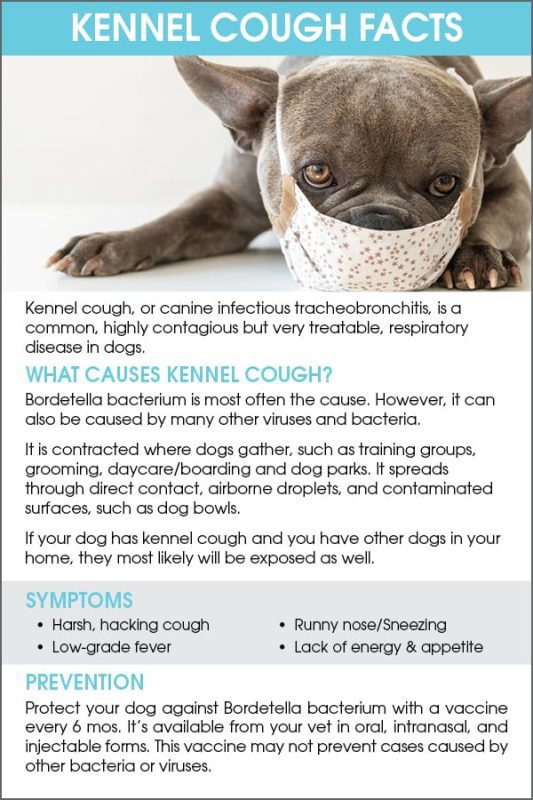
Cough in a dog – we understand the reasons
Every loving owner carefully monitors the health of his dog. If a pet develops a cough, it should not be ignored: it may be a symptom of a dangerous disease. In no case do not self-treat the animal, because you can misinterpret the nature of the dog’s cough. Treatment in this case may be erroneous and will only aggravate her condition.
What is a cough in dogs?
- Allergic
If the dog is coughing because of an allergy, then the cough will be dry, without phlegm. Usually, additional allergic symptoms are also present: the dog sneezes, its eyes become red and watery, the mucous membrane of the mouth has a bluish tint, a rash appears on the skin, it itches and swells. An allergen can be plant pollen, mold, dust mites, other animal dander, certain foods, insect bites, etc.
In this case, special cough medicines are not needed. It is necessary to isolate the dog from allergens, give it antihistamines and, if necessary, purchase hypoallergenic food.
- Nursery (enclosure)
Kennel cough in dogs indicates acute tracheobronchitis, which can be caused by several types of pathogens. From the outside, it seems that the dog has a cough, as if she was choking, – dry and sharp. May be accompanied by lack of appetite, fever, vomiting and runny nose.
Enclosure cough in dogs is transmitted by airborne droplets and therefore quickly spreads in places of accumulation of a large number of animals. A dog can become infected on the runway, in line to see the veterinarian, at the kennel or shelter (if you have recently taken him in). Symptoms of the disease appear very quickly, two to three hours after infection, and can last up to two and a half weeks.
The doctor makes a diagnosis after examining and listening to the respiratory tract. If the disease is mild, the doctor may prescribe a number of drugs. In severe cases of the disease, antibiotics are used.
- Heart cough in dogs
In diseases of the cardiovascular system, dogs may develop a dry intermittent cough. The dog becomes lethargic, gets tired quickly, refuses physical activity. Breathing is rapid, with a wide open mouth (you can notice the bluish color of the gums). The most common cause is mitral regurgitation or pericarditis. The diagnosis can only be made by a veterinarian after an ultrasound of the heart and additional studies.
- Cough with pneumonia
A wet cough combined with a high fever and general weakness can be a symptom of pneumonia. Most often, the causative agent is pathogenic bacteria, the reproduction of which leads to impaired lung function and a noticeable increase in temperature. This disease is easy to notice and treat with antibiotics.
Less commonly, pneumonia is caused by viruses, parasites, or fungi. Fungal pneumonia can be the result of prolonged use of antibiotics and a weakened immune system. Asymptomatic fungal pneumonia is especially dangerous because the dog does not receive the necessary antifungal medications.
Aspiration pneumonia occurs due to the ingestion of foreign objects, vomit or other fluids into the lungs. The veterinarian removes the foreign body and administers oxygen therapy.
An auscultatory examination, chest x-ray, sputum serology, and blood tests are required to make a correct diagnosis.
- Cough with angina
A dry, frequent cough in a dog may indicate the development of a sore throat and some other infectious diseases. The causative agents are streptococci and staphylococci, which affect the tonsils. In addition to coughing, with angina foamy discharge from the nose appears, then the temperature rises sharply, the animal refuses solid food. The mouth smells unpleasant, the tonsils are enlarged and coated. Diagnosis requires an examination by a doctor, who then prescribes antibiotics.
- Cough due to parasites
Often a cough in a dog is a symptom of a helminth infection. Some parasites at the larval stage of development are found in the bronchi and pulmonary alveoli. These are roundworms, hookworms and uncinaria. Infection occurs when the parasite egg enters the intestine or when the larvae penetrate the skin of the animal. Helminthiasis can be diagnosed by fecal analysis, complete blood count and sputum analysis. The veterinarian must correctly identify the parasite and prescribe a method of treatment, taking into account the age and weight of the dog, as well as the degree of infestation.
It is also possible infection with heartworms – dirofilaria. They enter the body of a dog with the bite of an infected mosquito. These parasites live in the heart, lungs, and large blood vessels where they can block blood flow and cause fatigue. In severe cases, surgery may be required.





